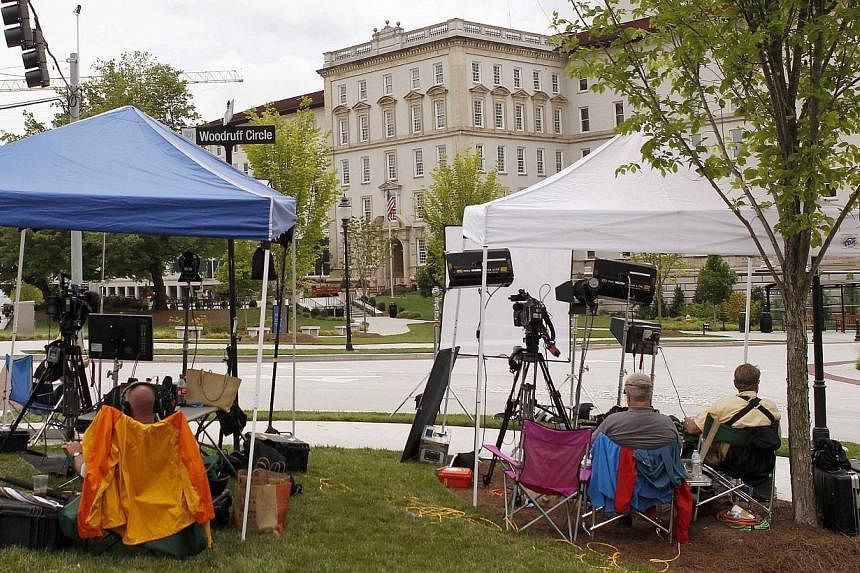ATLANTA - When it was announced last week that American doctor Kent Brantly who was stricken with the deadly Ebola virus while in Liberia was to be brought back to the United States for treatment, social media in the US was abuzz with fearful reactions.
That news echoed back in a wave of concern ranging from worry to Hollywood "Outbreak" scenarios and conspiracy theories, Fox News reported.
"As much as I respect the Samaritan's Purse workers with Ebola, I really don't want it anywhere near the US," a user posted on Twitter under the hashtag #EbolaOutbreak.
Samaritan's Purse is a North Carolina-based Christian organisation Dr Brantly works for. The 33-year-old father of two young children was in Liberia responding to the worst Ebola outbreak on record when he contracted the disease.
"Atlanta is 6 hours away & I know at least 2 people there. How many degrees of separation are between you and #ebola?" another netizen asked.
"The road to hell was paved with good intentions," wrote another. "What do we say to our kids When they get sick & die?"
"The government that can't keep track of its own emails wants us to trust they'll keep a deadly virus perfectly secure," Twitter user @erinhaust wrote.
"Who was in charge of making the decision to bring Ebola patient[S] to America for treatment? 300 million Americans have no say?" asked @Lrihendry.
Even tycoon Donald Trump got in on the act. "Ebola patient will be brought to the US in a few days - now I know for sure that our leaders are incompetent. KEEP THEM OUT OF HERE!" he wrote on Twitter.
Articles and Facebook pages have popped up claiming to reveal secrets about Ebola readers are not supposed to know - to protect clandestine interests.
On the website of conspiracy talker Alex Jones, who has long purported that the Centers for Disease Control and Prevention (CDC) could unleash a pandemic, and the government would react by instituting authoritarian rule, the news has been a feast of fodder.
"Feds would exercise draconian emergency powers if Ebola hits US," a headline read on infowars.com.
When a private air ambulance flew Dr Brantly in on Saturday, he became the first Ebola victim on US soil. The CDC has said it is not aware of any Ebola patient having been treated in the US previously. Five people entered the country in the past decade with either Lassa Fever or Marburg, both hemorrhagic fevers similar to Ebola.
But the arrival of people infected with Ebola is virtually inevitable, with the proliferation of daily international air travel, many experts have said.
It takes a while for symptoms to break out, so an infected person can get onto a plane feeling fine then fall ill after landing.
As inevitable as it is that some infected person will land within the US borders, experts say it is equally unlikely that patients like Dr Brantly would trigger an outbreak in the United States.
"The risk of secondary transmission - for them to actually infect other health care workers here in the United States or other people in the United States - the risk is very, very low," says virologist Dr Charles Chiu from the University of California San Francisco, Fox News reported.
Other experts emphasised that the virus can easily be kept in check in a developed country with a sophisticated public health system.
That's because it only becomes contagious once a person shows symptoms and can only be transmitted through contact with bodily fluids.
"I really think we should quell this uproar," said Dr Amar Safdar, associate professor of infectious disease and immunology at NYU Langone Medical Center, New York Daily News reported. "People are saying all sorts of things, but none of it is true."
"It's not like influenza or tuberculosis where you just have to be close to someone and breathe in the same air in a confined space," Dr Safdar said. "It's not easily transmitted."
Dr Brantly is now being treated by infectious disease specialists at Emory University Hospital in Atlanta.
A second US aid worker who contracted Ebola alongside him, missionary Nancy Writebol, will be brought to the US on a later flight.
Dr Bruce Ribner, an infectious disease specialist at Emory, repeatedly downplayed the risk for anyone who will be in contact with Dr Brantly or Ms Writebol
"We have two individuals who are critically ill, and we feel that we owe them the right to receive the best medical care," Dr Ribner said.

